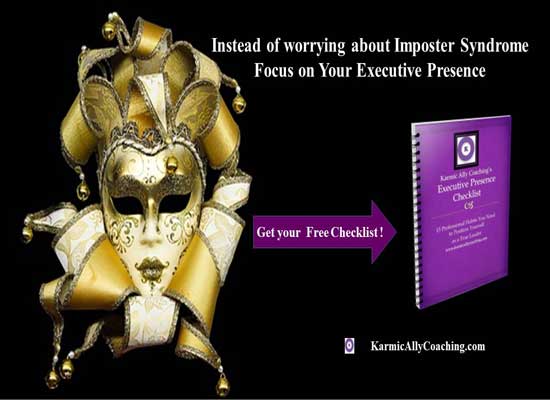This post has already been read 4017 times!

I believe experiencing Imposter Syndrome is a sign of growth and learning. It’s a rite of passage to further self-empowerment, personal and professional development.
I’ve never subscribed to the ‘fake it till you make it’ tactic because that is so inauthentic and takes me out of integrity. My core values are important to me. They are to any professional who prides himself or herself as a high achiever and ace service provider.
It wasn’t always like that though. I remember 2 major events in my life when I really felt like a fake, even though I wasn’t.
Both times I needed more experience and knowledge to get the job done. I knew this and yet, the fear of failure made me anxious. Thank God I had friends and mentors who showed me how to overcome this fear, reinforcing my belief in my abilities and succeed with flying colors.
Experiencing Imposter Syndrome Firsthand
My first encounter with Imposter Syndrome happened a little over 2 decades ago. I was seconded by my firm to an audit client for a few weeks to fill the post of Chief Financial Officer while the client hunted for a new person to fill the position.
This was an insurance industry client and as my colleague who was their Audit in Charge told me, all I had to do was sit at the desk and ‘look pretty’. The fact that I didn’t know anything about this industry did not affect her or my employers. My presence was earning them billable hours as we approached off-season.
My colleague was proceeding on a month-long vacation. The only briefing I got was that there had been an incident there. My presence was meant to keep the Finance and Administrative Staff morale up.
I was told to stay away from the top boss, the Country Manager because he ‘had a temper’. My colleague prided herself on being on good terms with him and her ability to ‘manage’ him.
A day into my secondment, I discovered the client was implementing a new accounting system along with a new insurance package that had to be interfaced.
The accounting and insurance staff floundering, lots of yelling going on outside.
There were some gaps in communicating requirements of the end user to the package implementers.
I got involved because besides being an auditor, systems and internal controls were my specialist skills. I had a higher level of accounting knowledge from my articleship days in London where part of our training had included doing accounts preparation for smaller clients.
Sitting pretty at my desk knowing I had the knowledge and expertise to help them, I couldn’t help but get involved. Besides, they were paying a princely sum per day to have me sit there doing nothing.
On Day 3 of my secondment, the Country Manager stopped by to chat with me.
He wanted to know more about my work experience and any observations I had about the new systems which had created the so-called incident when the CFO, who was an old school accountant decided to quit.
I gave my input and realized the Country Manager was actually a nice person. He had the responsibility of setting up a modern office in a country that was coming out of Russian influence post the USSR breakup.
In fact, everybody was nice in the office. The stress over 2 new systems that the Paris Headquarters wanted while also running a regular business and meeting sales targets was bringing out the worst in them.
2 weeks later, I was due for a short break to visit my parents in Minsk when my employer called me in to the office to tell me they were downsizing their expatriate staff. I would be on the next chopping list but expected to continue working at the client’s office.
Stunned as I was, I went on leave wondering what would happen on my return.
That’s when destiny kicked in.
On my return, my employer told me that I would be relieved of my duties as soon as the client found someone and was put on indefinite notice.
I proceeded to the client’s office unsure of my future while wondering if the client had run into any more problems while I was away.
On arriving, I met the Country Manager at the steps of the building. He was waiting for his wife to pick him up for a meeting (she kept the car as he was usually working late).
He told me how happy he was that I was back in time to help with the next phase of implementation. A few glitches had turned up in the interface of the accounting and insurance software.
It’s a scene I’ve never forgotten. Tears rolling down my cheeks, my apologies about crying and a client worried that something was wrong at home. Apparently, he’d noticed my worried look before I had gone on leave but had kept quiet at the time.
Slowly he extracted the truth from me and then exclaimed how wonderful this was!
It turned out that he was planning to offer me the position permanently and was wondering how to approach my employer. Now that I was on notice, he offered me the job right there on the steps!
My concerns about not knowing anything about the insurance industry were allayed by him. He took on the responsibility of enhancing my knowledge base about insurance.
At that moment a Teacher-Disciple relationship was formed that is still going strong even today.
I made the transition, and all was well until my colleague returned from her vacation and called me.
Her first words were “(Humph) God knows what he saw in you. It’s a matter of time before he knows he’s made a mistake”.
That’s the moment I felt the first tinge of Imposter Syndrome.
It got worse the next day over a client lunch where she kept putting me down.
When I told my new boss about the lunch exchange, he took it on as a personal challenge. Soon the entire office joined in a modern day version of making Eliza Dolittle an insurance specialist!
With an entire team rooting for me, I decided I had to prove her wrong and doubled my efforts to fit into my new role. 3 months later, I presented the budget in Paris as well as a 5-year plan for our country growth.
This experience helped me years later with new challenges because of self-belief.
Success is easier now when I step outside my comfort zone.
I have learned to make Imposter Syndrome my inner alarm. An indicator that the time for personal or professional development has come. Then all I have to do is raise the level of my game.
What is Imposter Syndrome?
According to Wikipedia, Impostor syndrome (also known as impostor phenomenon, fraud syndrome or the impostor experience) is a concept describing individuals who are marked by an inability to internalize their accomplishments and a persistent fear of being exposed as a “fraud”.
The term was coined in 1978 by clinical psychologists Pauline R. Clance and Suzanne A. Imes. It originally appeared in an article by them where they had observed many high-achieving women tending to believe that they were not intelligent and were over-evaluated by others.
While early research focused on the prevalence among high-achieving women, impostor syndrome has been found to affect both men and women, in roughly equal numbers.
Despite external evidence of their competence, those exhibiting the syndrome remain convinced that they are frauds. They feel they do not deserve the success they have achieved. Proof of success is dismissed as luck, timing, or as a result of deceiving others into thinking they are more intelligent and competent than they really are.
Another framework for understanding impostor syndrome is to rename it “impostor experience”.
In the words of Clance, “If I could do it all over again, I would call it the impostor experience, because it’s not a syndrome or a complex or a mental illness, it’s something almost everyone experiences.”
Reframing the vocabulary shifts one’s perspective to help them understand they are not isolated in this experience.
5 Signs you might have Imposter Syndrome
We might not even realize we are displaying signs of Imposter Syndrome. That’s because we don’t talk about it openly allowing our limiting beliefs and fears about ourselves to take over.

Here are 5 signs that are worth noting. While the list is not exhaustive, it might indicate that you are experiencing Imposter Syndrome.
- Minimizing your worth and value. This might show up as an inability to accept compliments and praise with grace. Instead, you feel awkward.
- You’re self-critical and focus on what you haven’t done or what didn’t work instead of also acknowledging the things you got right.
- You are always comparing yourself to others and finding faults with yourself.
- Your best simply isn’t good enough and you work even harder, whether it’s required or not. This is particularly true of high-achievers who compensate with longer hours and stretch goals for themselves. This comes at the cost of work life balance and ultimately experience burnout.
- You vacillate between the fear of failure and fear of success.
5 Tips to deal with Imposter Syndrome or Experience
We all experience this syndrome at some point or the other. The pain that the person feels is very real. The best way to deal with it is to nip it in the bud. This takes time but is worth it.
Acknowledge the fear and do it anyway
Once you accept and acknowledge you have a fear, it takes the sting out of the situation enabling you to do the task that you have to do.
Reframe your negative thoughts with a constant input of facts that provide evidence that you have what it takes.
I recommend maintaining a Success Log. Make daily entries in it until such time that you are able to automatically remind yourself of your capabilities and the value you bring to the table.
Ask others for their input if necessary. Remember, if you are promoted or given a new role, you have been chosen for a reason. Just the way I was offered the position of CFO when I didn’t know the first thing about insurance accounting or the insurance industry.
It’s important to focus on what we can control. So in my case, my thoughts were reframed from:
I may not be an expert in insurance accounting and business (which was true at the beginning) to
But I care about the business and in learning and doing what it takes to do my job to the best of my abilities and make a success of it. (true)
The ‘but’ part is important. You’re affirming to yourself that there is a bigger truth or counter argument to the limiting thought or partially true statement preceding it. It is empowering.
Maintain perspective and address the feelings in the right context
Stepping out of our comfort zone can be frightening at times but it doesn’t mean we are frauds. It simply means we need to focus our energies on making sure we take each step with a little more caution seeking advice if required.
This can be challenging if one is a perfectionist but with the right mindset anything is achievable.
There are 2 ways to do this:
- Visualize the end result that we want to achieve and hold that picture in our mind while we take on the challenge of the task and
- Reframe the context to one that is more favourable and encouraging.
Coming back to my experience, the reframe was:
“I’m not useless or incompetent when it comes to insurance business. Just because I am new to it and need to learn more right now doesn’t mean I am incompetent. I simply have to apply myself, accelerate the learning curve to close the gap”.
Seek support when required and be open to talking about your feelings
There are going to be times when we really are out of our depth. There is no shame in seeking support or guidance. In fact, successful leaders often have a coach who can mentor them. There is a reason for professional developments courses for different stages of one’s career.
Talking to the right people about our concerns helps to diffuse the situation for us. It can often provide us with guidance that we need to overcome a challenge.
Be kind to yourself
It’s human to goof up every now and then and you really don’t have to be perfect to achieve success.
It’s more important to accept one’s mistakes as learning experiences that will help us further down the road.
This means practicing self-acceptance.
It means accepting when we do get things right and not deflecting credit that is due to us to others.
It means celebrating our wins, no matter how small because small wins lead to big victories.
3 Ways you can use Imposter Syndrome to your advantage

Make it your internal trigger to set goals that will give you long term benefits
Competent professionals like to deliver excellent service, whether it’s to their employers or to their clients. When you feel the Imposter Syndrome, ask yourself the Why, What and How questions to get things back in perspective.
Why is it important for me to be able to deliver on the task that is frightening the living daylights out of me?
What is at stake over here if I succumb to the fear?
Now that I know the Why and the What, How am I going to get past this hurdle and get the task done?
The How question will lead to more analysis of what is required – resources, research, planning, actions, timelines and all those tasks that you need to perform.
Armed with that knowledge, set your goals and work on them.
Treat it as a learning opportunity
Experiencing Imposter Syndrome is a sign that it’s time to step out of our comfort zone and grow. We experience professional and personal development when we are willing to try new things, to learn new ways of doing work and gaining new knowledge.
It’s not enough to research and acquire new knowledge; it’s also a time to apply the new knowledge and figure out viable solutions.
That’s what I did to come up to speed with the insurance business. I knew accounting and I knew all about finance. The deficiency about the finer nuances of the business were covered by sitting with the staff in the different departments to understand how their work affected the other department’s work and formed a part of the whole business.
I was transparent about my lack of knowledge and my willingness to learn. My colleagues appreciated the honesty and filled the gaps in my knowledge base. In return, I showed them how I was creating the weekly reports that helped them achieve their targets. We all benefited.
Use your experience to develop your own personal leadership style
This is a tip that I give all my coaching clients who express their desire to become coaches and mentors to younger professionals at work.
No experience is ever wasted. Knowing what it feels like to experience imposter syndrome, you are in a position to reassure the younger professional or even a peer that it’s a normal feeling when one is stepping out of their comfort zone.
You are positioned to guide them through this painful journey and give tips to overcome the challenge.
That is what leaders and mentors do when exercising Emotional Intelligence.
It’s also an authentic method to raise your Executive Presence and get noticed as a potential candidate for the next rung of the corporate ladder.
For more authentic methods and actions, I invite you to check out Karmic Ally Coaching’s Executive Presence Workbook.
Final Words of Wisdom
Hopefully I’ve taken the sting out of Imposter Syndrome or Experience and shown you that it can be useful. I remember what my parents used to tell me when I was worried before an examination.
A good student is always scared not because he or she hasn’t done the work but whether they will do justice to the exam paper.
Keep that thought in mind the next time you are required to step up to the plate and perform outside of your comfort zone. You have what it takes, and this is just another steppingstone to your professional development.





 I adhere to the Certified Coaches Alliance Code of Ethics and Standards. A copy is available on request.
I adhere to the Certified Coaches Alliance Code of Ethics and Standards. A copy is available on request.
 Let's Talk through the Connect Form:
Let's Talk through the Connect Form:
Whoa! This is a powerful and insightful article! I love how you weaved your story and pearls of wisdom together to help us better understand Imposter Syndrome. I’ll be applying a handful of your tips into my experience. Thank you.
Thank you CK! In hindsight that experience back then has made it easier today to explain a concept that many of us deny and yet experience at some point or the other. The tips will help you use Imposter Syndrome in a better light.
Thank you for sharing your experience with us.
I can’t totally relate to this feeling.
I am on a journey of embracing me unconditionally and staying authentic.
Self-love and staying authentic are skills that will take you a long way, Leila. Keep it up!
I’m so glad you touched on the subject of integrity. That is my #1 rule. I also don’t believe in the “fake it till you make it” idea either. Great post!
Thanks Barb. Integrity is the armor that shields us even when the world doesn’t agree with our point of view.
Well, I’m relieved that I’m only running on three of those five signs. Which are enough to stop me on their own — far too often.
I guess I’m making some progress towards being 100% okay with me as I am.
3 out 5 is not bad, Sue, especially since you are being proactive in your approach. Well done!
Thanks for a great post, Vatsala, this is spot on and very helpful!
You’re welcome, Vanita. The tips work. All the best!
Excellent article! You summed what I’ve been going through in a nutshell. Now i can name it. Funny i just got onto the finance and insurance Business.
Thank you Cheri. Embrace the experience and let it guide you to further professional development and skill building. I know you’ll love the new job!
I really appreciate how you take an experience that might well be destabilizing or even traumatic and show how it is a) normal and common and b) a valuable sign that can help one take practical, growth-enhancing steps. It is wonderful that in the story you shared you received the support of your mentor – that, coupled with your determination to learn, succeed and excel, was a winning ticket!
Thanks Reba. Reflecting on your comment, I think there was another part to it – the fear that my colleague was right that outweighed the fear of failure. That was motivation 101! 🙂